The Huffington Post, 07/ 3/11
Chess, Jazz and Hockey Legends in Prague
The world chess champion Vishy Anand visited Prague in mid-June shortly before Czech president Vaclav Klaus celebrated his 70th birthday with a jazz concert at the Prague castle. Chess was always close to the president's heart and nobody was surprised when he showed up at Anand's simultaneous exhibition to see the world champion in action.
The Czech capital has a special meaning for Anand. In 2002 he won the Eurotel knockout tournament, the strongest rapid event in the history of chess. Anand defeated Anatoly Karpov in the final and finished ahead of such exceptional players as Garry Kasparov, Vladimir Kramnik, Vassily Ivanchuk, Alexei Shirov and Veselin Topalov. At the exhibition, Vaclav Klaus blended well with the spectators (standing second left in the picture below) and clearly enjoyed the Indian grandmaster's performance.
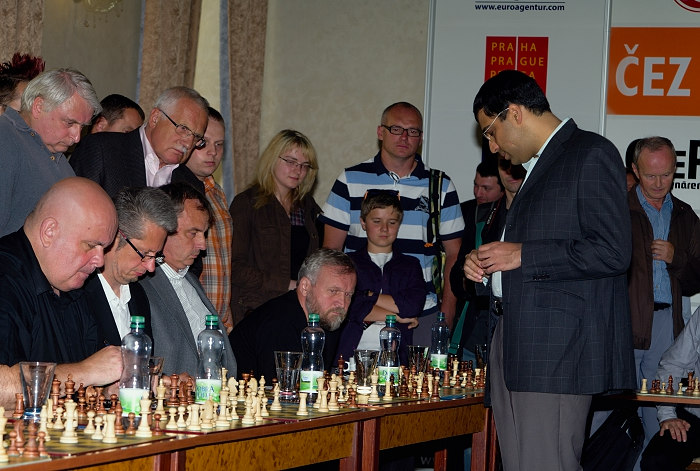
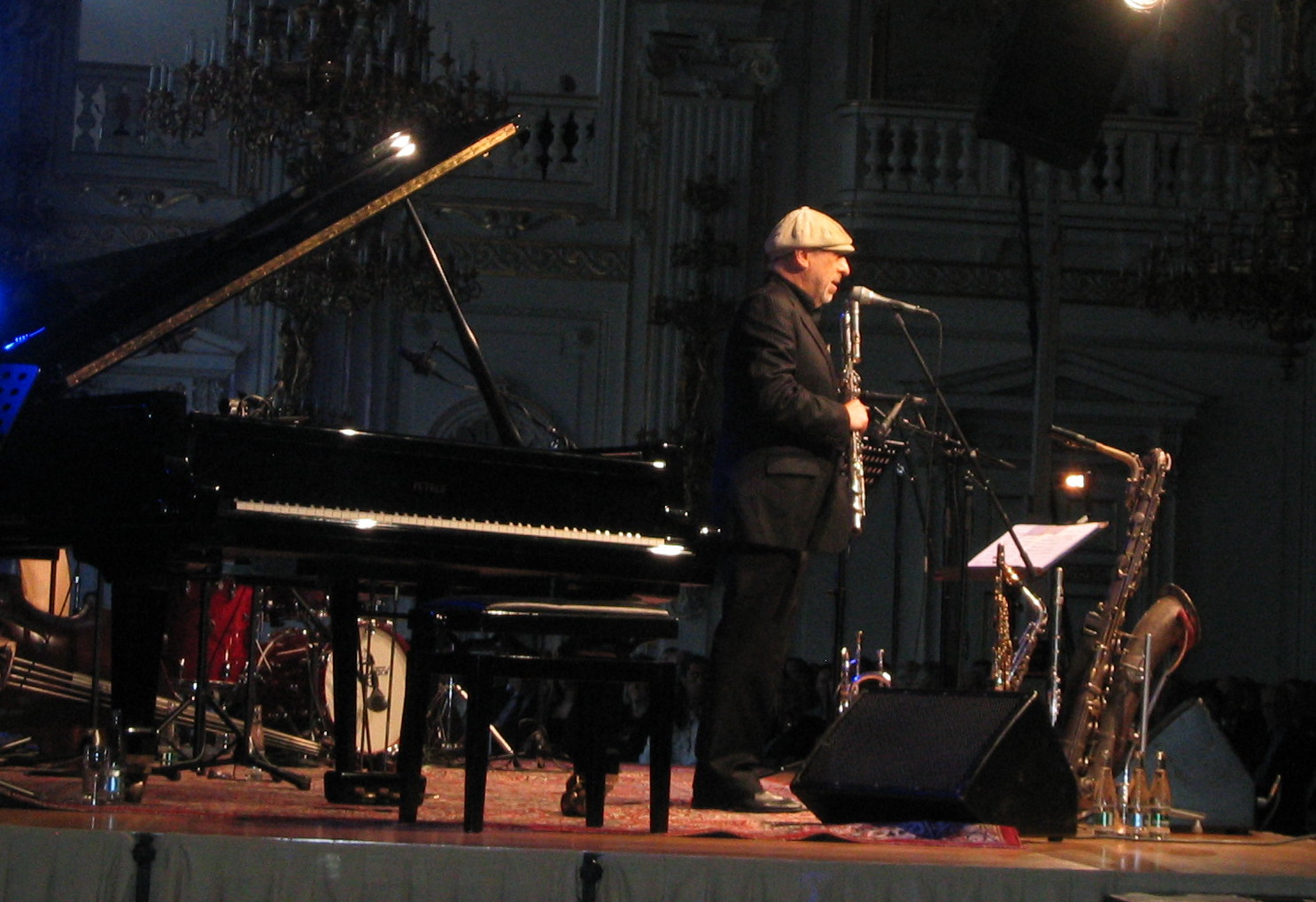
He is the Czech jazz answer to Wynton Marsalis. But Jiri Stivin, 69, plays more instruments than the American legend and does not limit himself to jazz. For the birthday concert at the Spanish Hall, he brought so many flutes and saxophones that they would fill three huge hockey bags. After the concert we took a picture with the Czech president who was pleased with the birthday celebration.
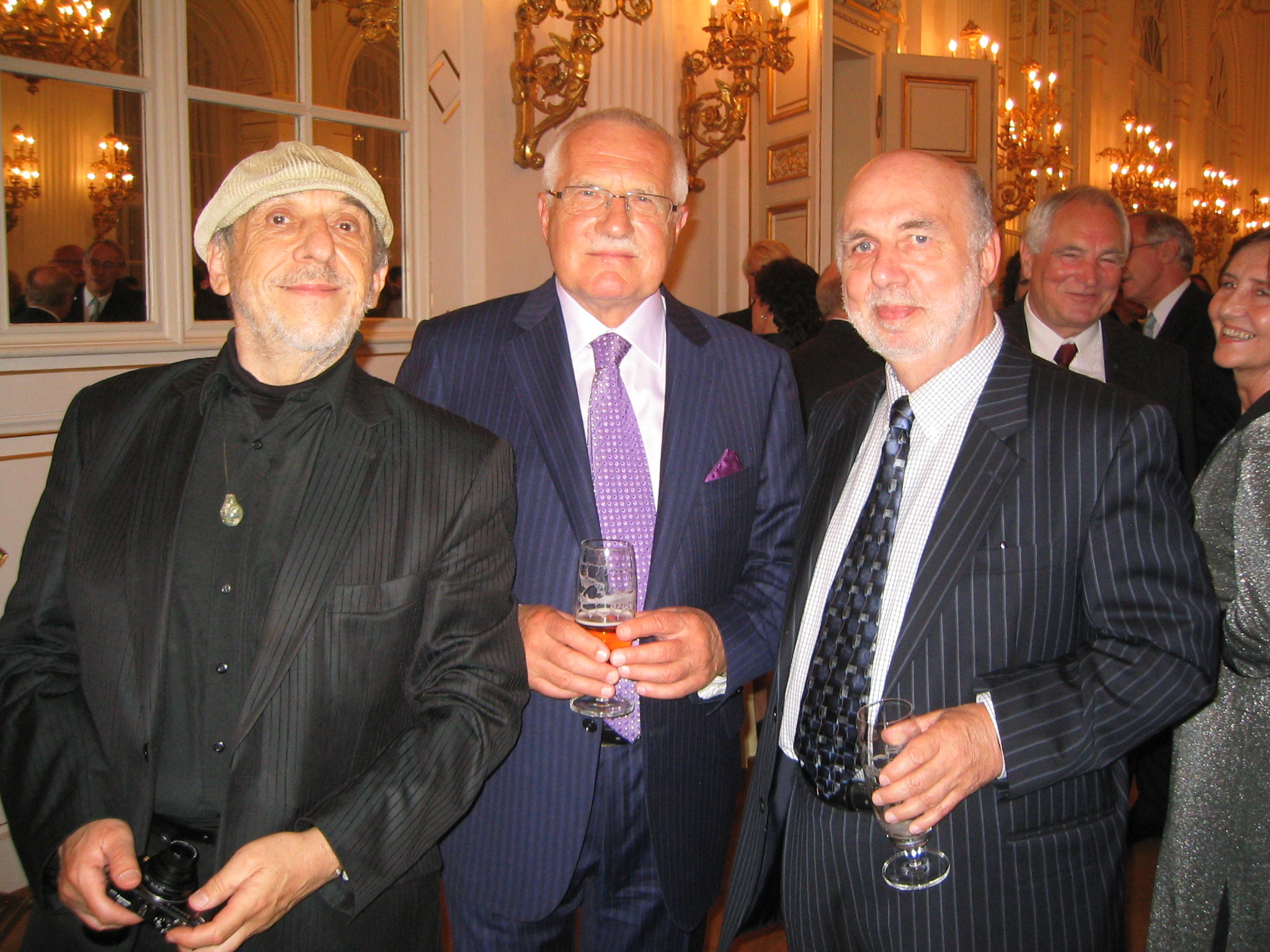
Stivin likes to play chess, although his lack of patience sometimes betrays him. He enjoyed solving this unusual Huffington Post column.

In 1998, the legendary goaltender led the Czech national team to the gold medal at the Winter Olympics in Nagano, Japan. In the same year, Wayne Gretzky called him the best player in the game, playing "in a stratosphere that others only wish they could be." Dominik Hasek spent 16 seasons in the NHL, winning six Vezina Trophies as the best goaltender and two Hart Trophies as the most valuable player, earning the nickname "Dominator." Finally, in 2002, he won the Stanley Cup with the Detroit Red Wings.
It was nice to see him in great spirits during a breakfast we had together with the Czech-American writer and filmmaker Jan Novak. After one year playing in Russia, Hasek is taking a year off hockey, exchanging skates for skis and a bicycle. In May he trained with a top Czech skier in the Austrian Alps. He plans to try his downhill skills in Chile, where European skiers train during the summer. Chess and golf are the only two sports where he may take it easy.
We talked about the upcoming NHL draft, unable to see Detroit and Pittsburgh withdrawing offers to Jaromir Jagr, who eventually ended with the Philadelphia Flyers. We also could not have guessed that the Washington Capitals will have two Czech goaltenders, Tomas Vokoun and Michal Neuvirth, in the next season.
Anand's simultaneous exhibition kicked off a week-long chess festival, well-organized by Pavel Matocha of the Prague Chess Society. It included the CEZ Chess Trophy, a six-game match between David Navara and Sergei Movsesian that ended with Navara's 3.5 to 2.5 victory. Old chess photographs, mainly from the chess Olympiad in Prague in 1931 and from the match Prague-Moscow in 1946, were on display during the opening ceremony. A new book on the first Czech chess professional, Karel Opocensky, was introduced to the public, but it deserves a special article. Several lectures on various chess topics from composing, history, stamps to books made the festival a big treat for chess fans.
Anand finished the exhibition with a 25-1 score. He lost to Petr Boleslav, the manager of the Czech championship team of Novy Bor and editor of its popular website. The next day Vishy joined me in the commentary room and showed the game to the public. It turned out that he played a variation against the King's Indian defense that I used successfully in 1973.
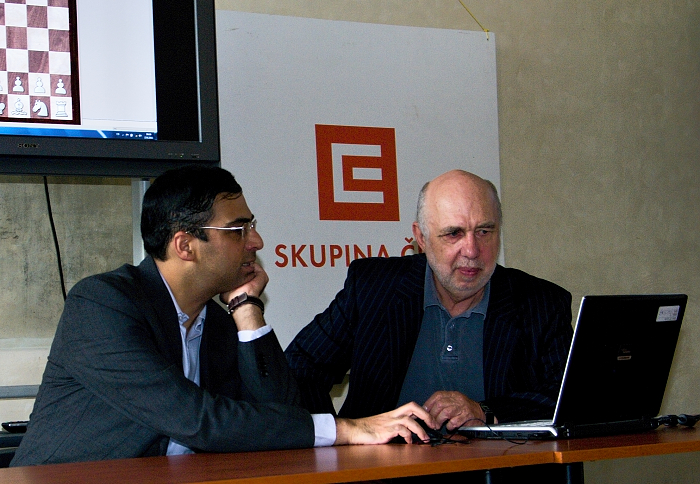
Anand,Viswanathan (2817) - -Boleslav,Petr (2127)
Simultaneous exhibition, Prague, 12.06.2011
1.c4 Nf6 2.Nc3 g6 3.g3 Bg7 4.Bg2 d6 5.Nf3 0-0 6.0-0 a6 7.d4 Nc6 (The Panno variation of the King's Indian defense.) 8.d5 Na5 9.b3 ( My pet variation in the 1970's. It is an unusual way to combat the Panno line, but it is still quite successful for white. The main line, of course, is 9.Nd2 c5.)
9...Rb8 (Preparing to advance the b-pawn at some point, but the simple 9...c5 10.dxc6 gives black two options: 10...bxc6 and 10...Nxc6 with the possibility to place the rook on c8. Of course, black can try the sharp 9...b5 immediately. Black can't take advantage of the "loose" diagonal a1-h8 with 9...Nxd5? because after 10.Nxd5 Bxa1 11.Bd2 c6 12.Bxa5 Qxa5 13.Nxe7+ Kg7 14.Qxa1+ white should win.)
10.Bb2 c5 (The thrust 10...b5 debuted on the international scene in the game Kavalek-Adorjan, Amsterdam 1977. It continued: 11.cxb5 axb5 12.Qd2 b4 13.Nd1 c5 14.dxc6 Nxc6 15.Ne1 Bb7 16.Ne3 e6 17.Nd3 Ba8 18.Nc4 d5 19.Nce5 Ne4 20.Bxe4 dxe4 21.Nxc6 Bxc6 22.Bxg7 Kxg7 23.Rac1 exd3 24.Rxc6 dxe2 25.Qxe2 and a draw was agreed.)
11.dxc6 bxc6 (After 11...Nxc6 12.Nd5!? white has the edge.)
12.Qd2 (This position appeared in two games I played in 1973.)
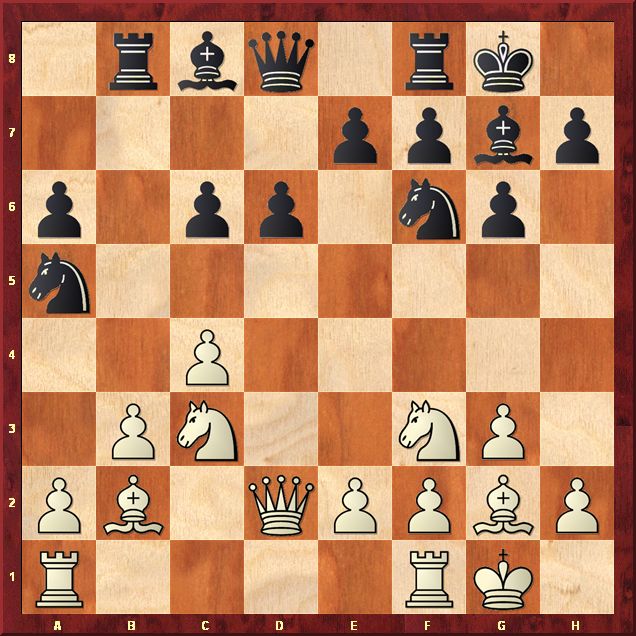
12...Bf5 (Something new. After 12...Bg4 13.h3 Bxf3 14.Bxf3 Nd7 15.Bg2 Ne5 16.Rab1 white was slightly better in Kavalek-Calvo, Lanzarote 1973, and won in 66 moves;
After 12...Be6 13.Nd1! [After 13.Rab1? Bxc4! 14.bxc4 Nxc4 15.Qc1 Rxb2 16.Rxb2 Nxb2 17.Qxb2 Nd5 wins for black.) 13...c5 14.Ng5 Bd7 15.Ne3 h6 and now instead of 16.Nh3, played in the game Kavalek-Domnitz, Netanya 1973, won by white in 51 moves, white should have tried 16.Ne4 with a slight edge.) 13.Rac1 Re8 14.Nd4 Bd7 15.e4 c5 16.Nde2 Nc6
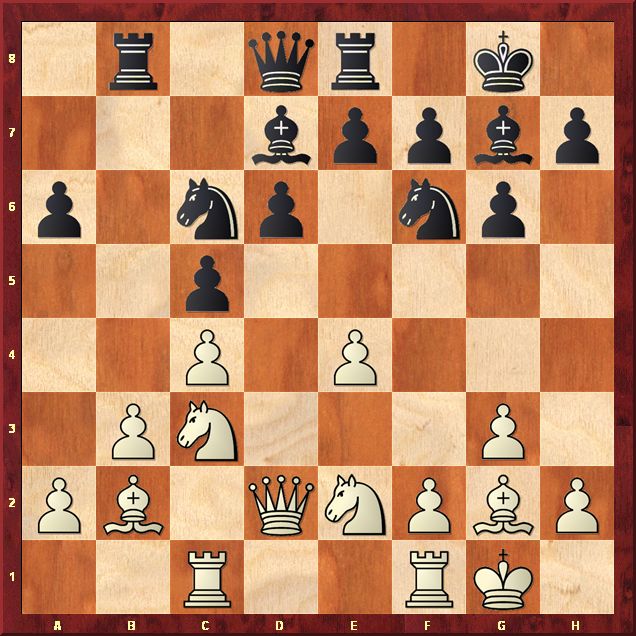
17.Nd5?! ("You play such moves almost automatically in simos," explained Anand. "I didn't realize that Black can play 17...e5. After 17.f4 white is fine.") 17...e5 18.f4 (After 18.Nxf6+ Qxf6 the pawn on d6 is protected and the black knight lands on the square d4. Still, white can play 19.f4 Qe7 20.Nc3 with a slight pull.) 18...Nxd5 19.cxd5 Nd4 20.Nxd4 (Giving black a dangerous passer, but sacrificing the exchange 20.fxe5 Nxe2+ 21.Qxe2 Bb5 [After 21...Bxe5 22.Bxe5 Rxe5 Black's position is only more comfortable.] 22.Qf2 Bxf1 23.Rxf1 Bxe5 24.Qxf7+ Kh8 25.Bxe5+ Rxe5 gives black a clear advantage.) 20...exd4 21.Kh1 Qb6 (Black is better, but Anand's next move throws the game away.)
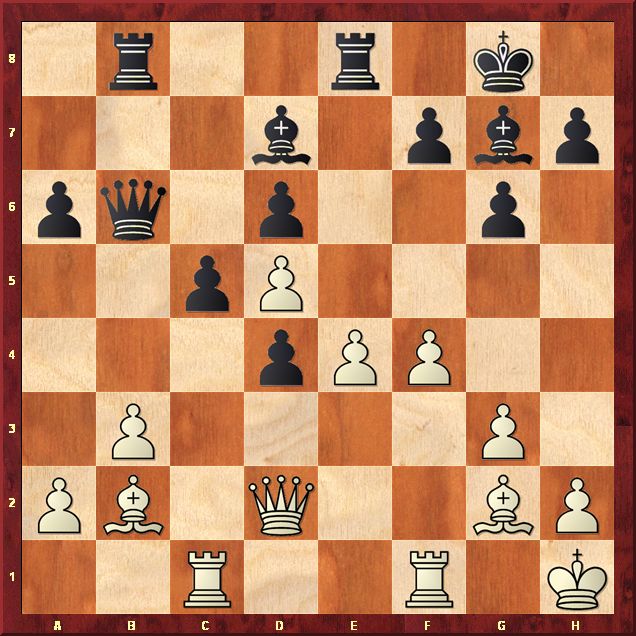
22.Rce1? c4 (There is no defense against the rolling stones.) 23.Bc1 c3 24.Qc2 Bb5 25.Rf3 f5 26.e5 dxe5 27.fxe5 Bxe5 White resigned.
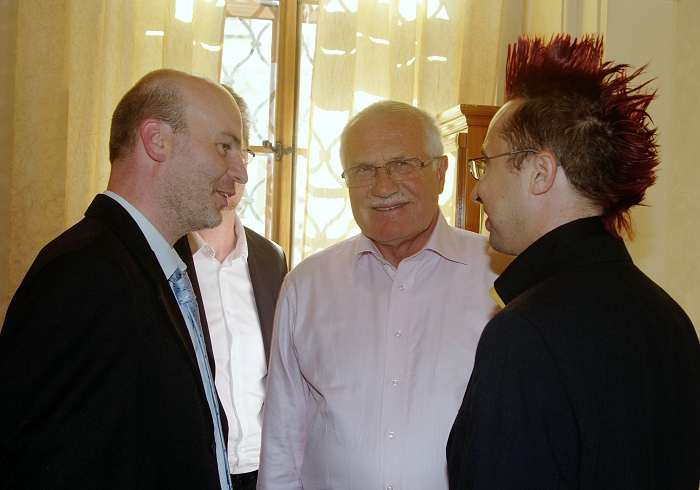
After the game, the happy winner Petr Boleslav (left) talked to the Czech president and the organizer Pavel Matocha.
No comments:
Post a Comment